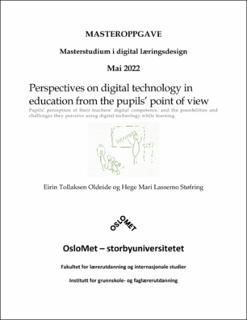| dc.contributor.advisor | Andreasen, Kristina Johnsdatter | |
| dc.contributor.advisor | Steier, Rolf | |
| dc.contributor.author | Oldeide, Eirin Tollaksen | |
| dc.contributor.author | Støfring, Hege Mari Lassemo | |
| dc.date.accessioned | 2022-08-16T07:10:22Z | |
| dc.date.available | 2022-08-16T07:10:22Z | |
| dc.date.issued | 2022 | |
| dc.identifier.uri | https://hdl.handle.net/11250/3012001 | |
| dc.description.abstract | Introduction: The use of digital tools and software in schools has increased dramatically since the turn of the century. Norway has one of the world’s highest numbers of digital devices per pupil in schools, and Norwegian classrooms are increasingly dependent on digital technology. However, we could not find much research on the topic of the pupils’ perspectives on the use of ICTs in learning. This thesis aims to raise the pupil’s voice and shed light on their experiences with the use of digital tools in their learning, and their views on their teachers’ digital competence.
Theory and frameworks for analysis: The TPACK framework was chosen as a framework to code and analyse the pupils’ statements about their teachers’ digital competence. Theory on digital classroom management, the potential for disruptions from technology in the classroom and pupils’ motivation and boredom is also used.
Method: The data used in this thesis was collected by the Norwegian DigiGen research group, as a part of a larger study on the impact of digital technology on the lives of children and young people. Data was collected through semi-structured interviews with children in the year of their transition from seventh to eighth grade, or primary to lower secondary school. The interviews were video recorded, and these recordings were used to create written transcripts which were then coded using NVivo.
Main findings: The pupils generally find that their teachers are good enough at using technology in the classroom, and they appreciate teachers who use digital tools efficiently. They are aware of differences in skill levels between their teachers – both when it comes to technological competence and digital classroom management. The pupils mention some challenges with using digital tools in learning, such as the potential for disruption, the risk of being exposed to false information on the Internet and issues with infrastructure, such as the internet connection being slow or unstable. However, they mainly express positive attitudes towards digital tools in learning, and state that digital technology makes learning easier by simplifying writing and editing, providing easy access to information on the Internet and organising tasks and teacher-pupil communication. They find learning with digital technology more motivating, and interestingly, they remark that the use of technology in class can free up time for the teachers to help pupils more. | en_US |
| dc.language.iso | eng | en_US |
| dc.publisher | OsloMet - Storbyuniversitetet | en_US |
| dc.subject | Pupils' voices | en_US |
| dc.subject | Pupils' perspectives | en_US |
| dc.subject | Pupils' attitudes | en_US |
| dc.subject | DigiGen | en_US |
| dc.subject | Teachers' digital competencies | en_US |
| dc.subject | Digital tools | en_US |
| dc.subject | ICTs in learning | en_US |
| dc.subject | Digital classroom management | en_US |
| dc.title | Perspectives on digital technology in education from the pupils’ point of view. Pupils’ perception of their teachers’ digital competence, and the possibilities and challenges they perceive using digital technology while learning | en_US |
| dc.type | Master thesis | en_US |
| dc.description.version | publishedVersion | en_US |
| dc.source.pagenumber | 162 | en_US |
| dc.subject.nsi | VDP::Samfunnsvitenskap: 200::Pedagogiske fag: 280::Andre pedagogiske fag: 289 | en_US |
